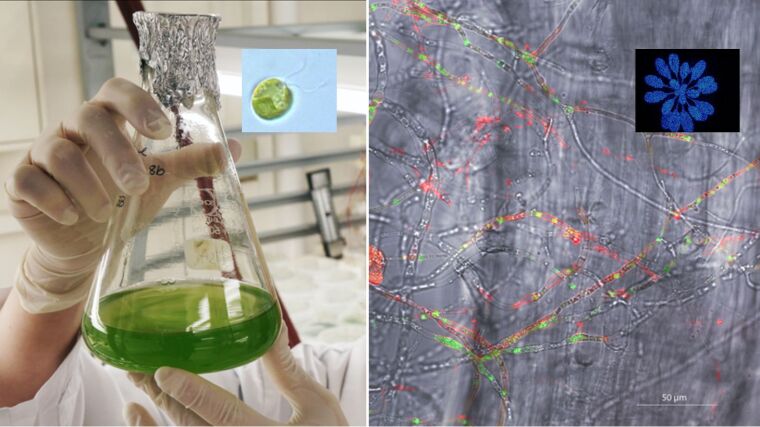
The structural unit Molecular Botany includes three research groups. For the education of the students, we offer topic specific teaching courses primarily within the Bachelors of Biology, Biochemistry and Bioinformatics, in the Higher School Education Program for Biology and in the Master Molecular Life Sciences.
Professorship for General Botany
Our research concerns the molecular mechanism of biological circadian clocks. Circadian (circa = about; diem = day) clocks exist from cyanobacteria to humans and control numerous cellular processes. The endogenous clock is entrained by so called "Zeitgeber". The most important "Zeitgeber" are light-dark as well as temperature cycles. We are especially interested in understanding receptors perceiving light and temperature information. We analyze their functional modes of action to entrain circadian clocks or to regulate other processes such as developmental cycles, photosynthesis or growth rates. We have chosen the green alga Chlamydomonas reinhardtii as primary model organism. The unicellular alga has a primitive visual system, the eyespot as well as two flagella for movement and orientation with a light gradient and possesses numerous photoreceptors. Light and nutrients control its sexual cycle. Moreover, we examine the interaction of microalgae with other microorganisms taking freshwater and marine Chlamydomonas spp. As models. We are looking for chemical mediators that influence these interactions as well as for the resulting signalling cascades.
Professorship for Plant Physiology
Three main topics are investigated at the professorship for plant physiology: a) interaction of plants with microorganisms, b) vascular biology and c) biogenesis of chloroplasts. Besides direct research on these topics, we try to understand how these research fields are connected. Newly identified non-pathogenic root-colonizing fungi mediate stress resistances in plants. The information will be transported systemically to the whole plant via the vascular system. Plastid-derived signals, metabolites and phytohormone precursor play crucial roles in the decision of the plant to invest in either growth or defence/stress responses. Molecular biology techniques, biochemistry, diverse microscopical techniques and methods, genetic studies on model organisms, modern analytic and –omics approaches are used to investigate the physiological, genetic and chemical background of plant stress adaptation and associated developmental processes.
Junior Professorship of Synthetic Biology of Photosynthetic Organisms
Our research focuses on developing and utilising synthetic biology principles to improve photosynthetic cell factories. Our interest is to advance photosynthetic host chassis as a sustainable alternative towards biotechnological applications. To achieve this, we are using metabolic and genetic engineering techniques as well as molecular biology and biochemical methods. We are mainly working with cyanobacteria and with the eukaryotic model microalga Chlamydomonas reinhardtii. Apart from their plethora of proposed applications, we are also interested in unravelling fundamental cell biological processes (such as protein trafficking). Additionally, we want to gain more insights into the processing of environmental signals in co-cultures and communities of these organisms.